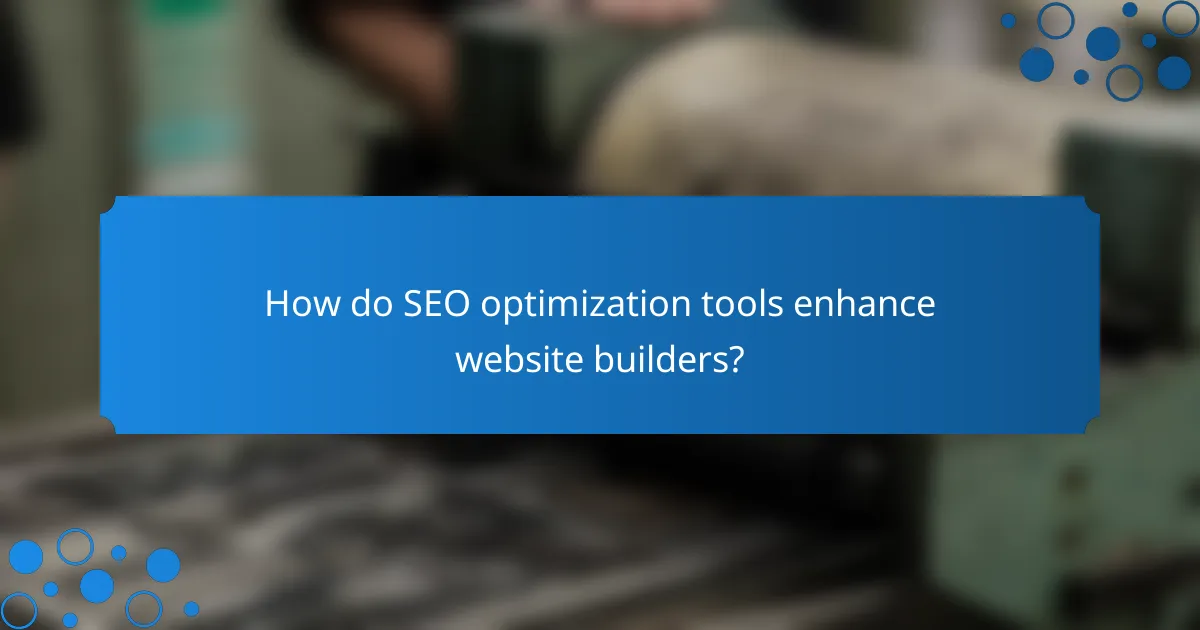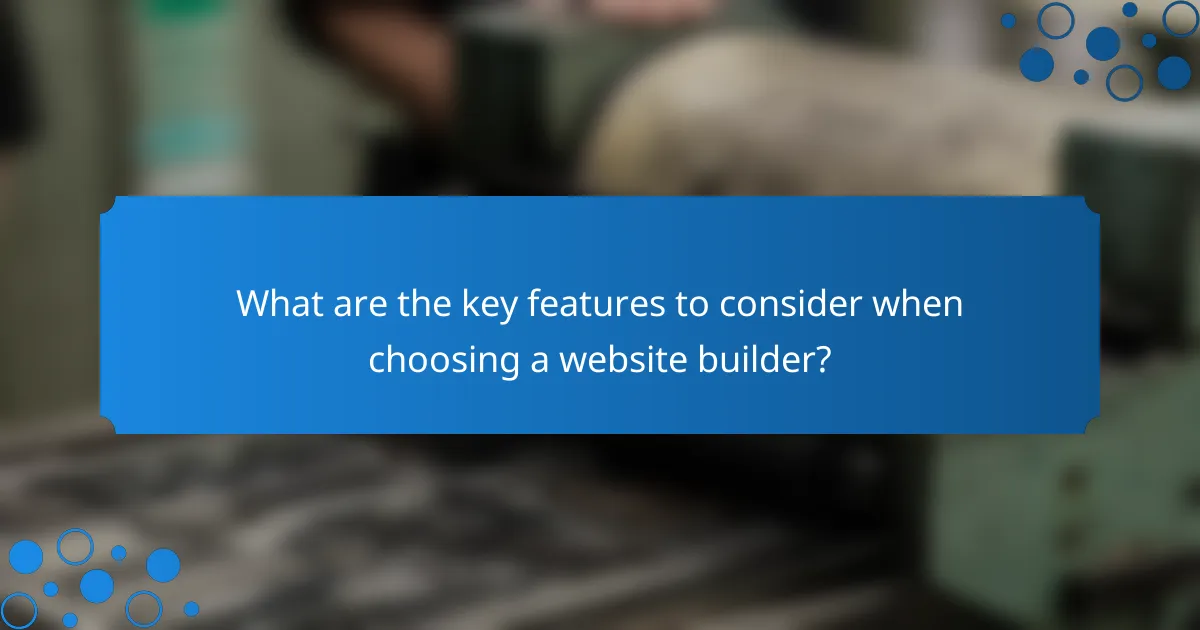Website builders with drag-and-drop interfaces, such as Wix and Squarespace, empower users to create stunning websites without any coding knowledge. These platforms offer a diverse array of templates and customization options, ensuring that every site can reflect its unique brand identity. Additionally, built-in SEO optimization tools help enhance visibility on search engines, making it easier for users to attract and retain visitors.

What are the best website builders for drag-and-drop interfaces in the UK?
The best website builders with drag-and-drop interfaces in the UK include Wix, Squarespace, Weebly, WordPress.com, and Shopify. These platforms allow users to easily create websites without needing extensive technical skills, offering a range of templates and customization options.
Wix
Wix is known for its intuitive drag-and-drop interface, making it easy for users to design their websites visually. It offers hundreds of templates across various categories, allowing for significant customization. Users can add elements like images, text, and videos simply by dragging them onto the page.
One of Wix’s standout features is its App Market, which provides additional functionalities such as SEO tools and e-commerce capabilities. However, users should be aware that switching templates after publishing can be challenging, so it’s best to choose wisely from the start.
Squarespace
Squarespace offers a sleek, modern design aesthetic with its drag-and-drop functionality. It is particularly popular among creatives and businesses looking for visually appealing websites. The platform provides a variety of professionally designed templates that are fully responsive on mobile devices.
While Squarespace includes built-in SEO optimization tools, users should note that its customization options are somewhat limited compared to others like Wix. This can be a trade-off for those prioritizing design over extensive functionality.
Weebly
Weebly is another user-friendly website builder that features a straightforward drag-and-drop interface. It is particularly suitable for small businesses and personal sites, offering a range of templates that are easy to modify. Weebly also includes e-commerce features, making it a good choice for online stores.
One of Weebly’s advantages is its integrated marketing tools, which help users optimize their sites for search engines. However, its design flexibility is less extensive than that of Wix or Squarespace, which may limit some users’ creative options.
WordPress.com
WordPress.com provides a drag-and-drop editor that simplifies the website creation process, especially for those familiar with the WordPress ecosystem. It offers a wide selection of themes and plugins, allowing for extensive customization and functionality.
While WordPress.com is powerful, users should be aware that it has a steeper learning curve compared to other builders. Additionally, some advanced features may require a paid plan, so it’s essential to consider budget and needs before starting.
Shopify
Shopify is primarily focused on e-commerce, providing a robust drag-and-drop interface for building online stores. It offers a variety of templates specifically designed for selling products, along with integrated payment processing and inventory management tools.
For those looking to establish an online shop, Shopify’s ease of use and comprehensive features make it a top choice. However, users should be mindful of transaction fees and subscription costs, which can add up depending on the plan selected.

How do SEO optimization tools enhance website builders?
SEO optimization tools significantly enhance website builders by providing essential features that improve visibility and ranking on search engines. These tools help users implement best practices for on-page SEO, analyze keywords, and monitor site performance, making it easier to attract and retain visitors.
Built-in SEO features
Many website builders come equipped with built-in SEO features that streamline the optimization process. These features often include customizable meta tags, alt text for images, and user-friendly URL structures. Utilizing these tools can help ensure that your website is indexed properly by search engines.
For example, a builder might allow you to edit title tags and meta descriptions directly within the site editor, making it simple to optimize each page without needing extensive technical knowledge.
Keyword analysis tools
Keyword analysis tools integrated into website builders help users identify relevant keywords and phrases that potential visitors are searching for. These tools often provide insights into search volume, competition, and related keywords, allowing you to tailor your content effectively.
When selecting keywords, aim for a mix of high-volume and long-tail keywords to capture a broader audience. Regularly updating your keyword strategy based on performance can lead to improved search rankings over time.
Site performance tracking
Site performance tracking tools are crucial for understanding how well your website is performing in terms of SEO. These tools typically monitor metrics such as page load speed, bounce rates, and user engagement, providing valuable data to inform your optimization efforts.
For effective tracking, consider setting up regular reports to analyze trends over time. This will help you identify areas needing improvement and assess the impact of your SEO strategies on overall site performance.

What template variety do popular website builders offer?
Popular website builders provide a wide range of templates that cater to various industries and design preferences. Users can choose from hundreds to thousands of customizable options, allowing for unique branding and functionality tailored to specific needs.
Wix template library
The Wix template library boasts over 500 designer-made templates, covering categories like business, portfolio, and online store. Each template is fully customizable, enabling users to adjust layouts, colors, and fonts easily using the drag-and-drop interface.
When selecting a template on Wix, consider your website’s purpose and the features you need, such as galleries or booking systems. Avoid overly complex designs that may confuse visitors or detract from your content.
Squarespace design options
Squarespace offers around 100 sleek, modern templates that are particularly well-suited for creatives and businesses seeking a polished online presence. Each template is responsive, ensuring that your site looks great on both desktop and mobile devices.
Focus on templates that align with your brand aesthetic and functionality requirements. Squarespace allows for extensive customization, but be cautious not to stray too far from the template’s original design, as this can affect usability.
Shopify themes
Shopify features a selection of over 70 professionally designed themes, specifically tailored for e-commerce. These themes are optimized for selling products, with built-in features like shopping carts, product galleries, and payment gateways.
When choosing a Shopify theme, prioritize those that enhance user experience and showcase your products effectively. Keep in mind that while many themes are free, premium options may offer additional functionalities that could be worth the investment for larger stores.

What are the key features to consider when choosing a website builder?
When selecting a website builder, consider ease of use, customization options, and integration capabilities. These features will significantly impact your ability to create a functional and visually appealing website that meets your needs.
Ease of use
Ease of use is crucial for anyone looking to build a website without extensive technical knowledge. A drag-and-drop interface allows users to place elements on the page effortlessly, making the design process intuitive.
Look for builders that offer user-friendly tutorials and customer support. This can save time and frustration, especially for beginners who may encounter challenges during the setup process.
Customization options
Customization options determine how unique your website can be. A wide variety of templates allows you to select a design that aligns with your brand identity, while flexible editing tools enable you to modify layouts, colors, and fonts.
Consider whether the builder allows for custom code integration if you require advanced features. This can enhance functionality but may require some coding knowledge.
Integration capabilities
Integration capabilities refer to how well the website builder connects with other tools and platforms. Look for options that support popular services like email marketing, social media, and e-commerce solutions.
Seamless integration can streamline your workflow and enhance your website’s functionality. Ensure that the builder you choose can easily connect with the tools you plan to use, such as payment processors or analytics software.

How do pricing plans vary among website builders?
Pricing plans for website builders differ significantly based on features, functionality, and target users. Most platforms offer tiered subscriptions that cater to various needs, from personal blogs to e-commerce sites, with costs typically ranging from low monthly fees to higher rates for advanced capabilities.
Wix pricing tiers
Wix offers several pricing tiers, starting from a free plan with basic features to premium plans that unlock advanced functionalities. The premium plans generally range from around $14 to $49 per month, depending on the features included, such as e-commerce capabilities and additional storage.
When choosing a Wix plan, consider your specific needs, such as whether you require a custom domain or e-commerce tools. It’s advisable to evaluate the features included in each tier to ensure you select the most cost-effective option for your website goals.
Squarespace subscription models
Squarespace has four main subscription models, with prices starting at approximately $16 per month for personal use and going up to around $54 per month for advanced business features. Each model includes different levels of support, storage, and e-commerce capabilities.
For users focused on building an online store, the Business and Commerce plans offer essential tools for selling products, but they come at a higher price. Assess your website’s requirements and budget to determine the most suitable Squarespace subscription for your needs.
Shopify pricing options
Shopify’s pricing options cater specifically to e-commerce, with plans starting at about $39 per month and going up to $399 for advanced features. Each plan includes various tools for managing an online store, such as payment processing and inventory management.
When selecting a Shopify plan, consider factors like transaction fees and the level of support needed. For small businesses, the Basic plan may suffice, while larger enterprises might benefit from the Advanced or Plus plans for enhanced capabilities and lower fees on transactions.

What are the limitations of using website builders?
Website builders offer convenience but come with several limitations that can impact functionality and customization. Users may encounter restrictions in design flexibility, scalability, and SEO capabilities, which can hinder long-term growth and performance.
Drag-and-drop interface
The drag-and-drop interface simplifies the website creation process, making it accessible for users without technical skills. However, this ease of use often comes at the cost of limited customization options, which can restrict unique branding and design elements.
Many builders provide pre-set layouts and elements, but users may find it challenging to implement specific features or designs that deviate from these templates. This can lead to a generic appearance, making it harder to stand out in a competitive market.
Template variety
While website builders typically offer a range of templates, the variety may not meet every user’s needs. Users might find that popular themes are overused, leading to a lack of originality in their websites.
Additionally, some templates may not be fully responsive or optimized for all devices, which can negatively affect user experience. It’s essential to choose a template that not only looks good but also functions well across different screen sizes.
SEO optimization tools
Many website builders include basic SEO optimization tools, but these features can be limited compared to dedicated platforms. Users may struggle with advanced SEO techniques, such as custom meta tags or in-depth analytics, which are crucial for improving search engine rankings.
Furthermore, some builders may not allow full control over URL structures or site speed optimization, which are vital for effective SEO. To enhance visibility, users should consider supplementing their website builder with additional SEO tools or services.
